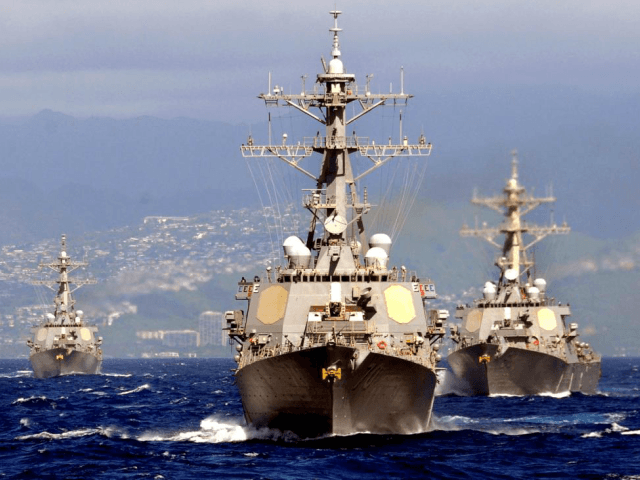Assistant Secretary of Defense for Asian and Pacific Security Affairs Randall Schriver said earlier this week at a think-tank event that the United States Navy will continue to challenge China’s claims over the South China Sea, which are disputed by six other nations in the region.
He said the U.S. will continue “freedom of navigation” operations that include sailing U.S. Navy ships through the South China Sea, and raised the prospect of other countries joining in on “presence activities.”
“I think what you’ll see is certainly a continuation of freedom of navigation. I think you’ll see perhaps more countries joining in presence activities — which if not a 12-nautical mile challenge presence in the South China Sea — is important because China claims the whole thing through the 9-dash line,” Schriver told an audience at the American Enterprise Institute on Tuesday.
Freedom of navigation operations involve U.S. Navy ships sailing through the South China Sea within 12-nautical miles of territory claimed by China, to illustrate that the waters remain open to international passage.
Typically, countries consider waters within 12-nautical miles to be their territorial waters, and by sailing through it, the U.S. Navy exhibits they are not Chinese territory. The “9-dash line” refers to an area marked with nine dashes that China claims, that encompasses the entire South China Sea.
One-third of the world’s shipping passes through the South China Sea, and there are large fisheries and possible oil and gas reserves. The hundreds of islands, reefs, and other land features China claims are also claimed by Indonesia, Taiwan, the Philippines, Vietnam, Brunei, and Malaysia.
Presence activities could include exercises, port visits, and other naval activity not necessarily within the 12-nautical line.
Over the past decade, China has been aggressively building islands in the South China Sea and emplacing military equipment on them, in a bid to solidify its territorial claims that are hundreds of miles away from the Chinese mainland.
In that effort, China has literally built reefs and islets into islands using seafloor sediment, then constructed ports, military installations, and airstrips on those islands. Other claimants have done the same, though not at the same speed and scale as China.
The Obama administration had stopped conducting freedom of navigation operations through the South China Sea from 2012 to 2015, out of concern over angering Beijing.
While the Trump administration has continued freedom of navigation operations through the South China Sea, China has not stopped placing more military equipment on them.
In May, CNBC reported that China had quietly installed anti-ship cruise missiles and surface-to-air missile systems on three of its outposts on the Spratly Islands in the South China Sea.
In response, Defense Secretary Jim Mattis disinvited China from Rim of the Pacific (RIMPAC), the world’s largest maritime naval exercises hosted by the U.S. Navy.
Schriver called the militarization “problematic.”
“It goes against the pledges that [Chinese President] Xi Jinping made in the Rose Garden in 2015 with President Obama. It’s also a problem because it’s associated with an unlawful sovereignty claim that’s very expansive and I think would threaten the rules-baed international norms that all countries benefit from,” he said.
“And its not just the militarization, it’s the increasing behavior where we see more shadowing and harassment, where we see cautionary notes about how transits are made by military vessels, so this is of great concern.”
He added that would potentially be more “cost-imposition” for China’s behavior in the South China Sea.
“I think you’ll potentially see more cost-imposition even if it’s not directly on point. We don’t have to do something in the South China Sea per se to express our concern about what China is doing in the South China Sea themselves,” he said.
He said the U.S. will try to shine a light on Chinese behavior.
“I think what we want to do is to make more information public, shine a light on this activity so there’s no doubt, occasionally we run into challenges with declassifying things and doing it quickly enough but over time we want a light shined on this behavior because it is a concern to everyone in this region,” he said.
Schriver also expressed strong support for Taiwan, which China considers a rogue Chinese province, not a separate country. Taiwan has been self-governing since 1949, when Chinese nationalists fled to the island after the Chinese civil war. Chinese leadership have pledged to reunify Taiwan under Chinese Communist rule by 2049, despite it having a vibrant democracy.
“We think Taiwan is an important contributor to the Indo-Pacific’s free and open concepts, it certainly demonstrates the free part in terms of internal good governance, democracy, respect for humanitarian rights, religious freedom,” he said.
“We think there’s a role for Taiwan to uphold those values throughout the region in particular ways. Taiwan has a great record, historically, on humanitarian affairs, disaster relief, many times through its NGOs, and I think it’s to our benefit to think creatively, given our non-diplomatic relationship, think creatively on how we can continue to partner with Taiwan to promote those values.”
Breitbart News reported exclusively last week that the U.S. Navy, for the first time since 2007, publicly confirmed on-the-record that it had sailed U.S. Navy ships through the Taiwan Strait. Previously, there was a “stranglehold” on releasing that information, a Navy official said.

COMMENTS
Please let us know if you're having issues with commenting.